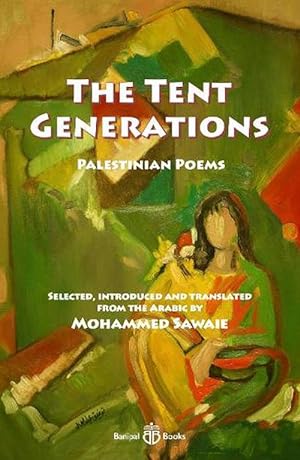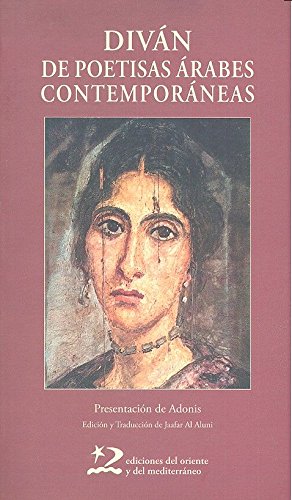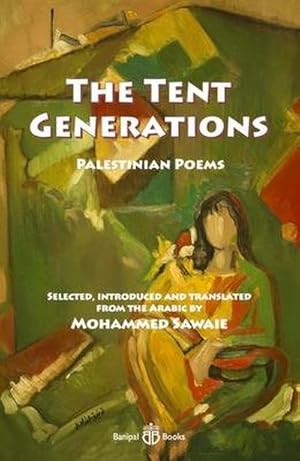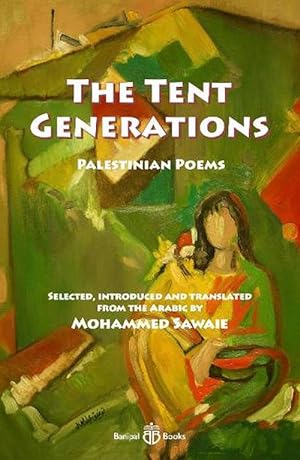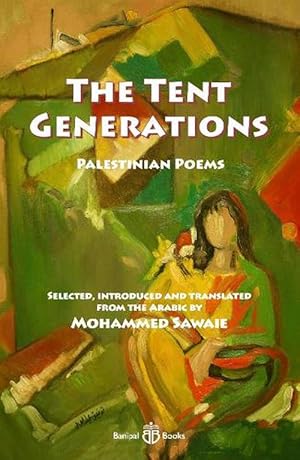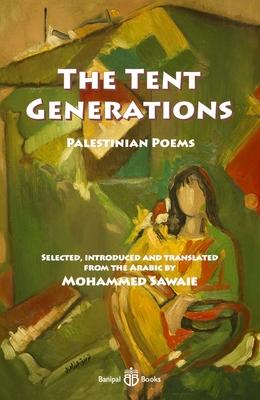Tuqan Fadwa (34 results)
Product Type
- All Product Types
- Books (34)
- Magazines & Periodicals
- Comics
- Sheet Music
- Art, Prints & Posters
- Photographs
- Maps
-
Manuscripts &
Paper Collectibles
Condition
Binding
Collectible Attributes
- First Edition (1)
- Signed
- Dust Jacket (1)
- Seller-Supplied Images (5)
- Not Printed On Demand
Free Shipping
Seller Location
Seller Rating
-
Text Generations
Published by Banipal Publishing, 2023
ISBN 10: 1913043185ISBN 13: 9781913043186
Seller: GreatBookPrices, Columbia, MD, U.S.A.
Book
Condition: As New. Unread book in perfect condition.
-
Text Generations
Published by Banipal Publishing, 2023
ISBN 10: 1913043185ISBN 13: 9781913043186
Seller: GreatBookPrices, Columbia, MD, U.S.A.
Book
Condition: New.
-
The Tent Generations (Paperback)
Published by Banipal Books, London, 2022
ISBN 10: 1913043185ISBN 13: 9781913043186
Seller: Grand Eagle Retail, Wilmington, DE, U.S.A.
Book
Paperback. Condition: new. Paperback. From the Introduction by Mohammed Sawaie:The Palestinian poets included in The Tent Generations, Palestinian Poems represent different age groups and backgrounds, yet they all express a strong sense of Palestinian-ness. They include Israeli citizens, the offspring of those who remained in Palestine after 1948. They also include poets who lived or continue to live in the West Bank and Gaza, areas that are still occupied, or controlled by Israelis as of this writing. Finally, they include poets born in Palestine, but whose families were expelled, or migrated to neighboring Arab countries as a result of the Arab-Israeli wars of the Nakba in 1948, and then of 1967 and 1973.The educational backgrounds of the poets represented here vary. Salem Jubran, Samih al-Qasim, Tawfiq Zayyad, and Marwan Makhoul, for example, were products of the Israeli educational system. Others attended institutions of learning in various Arab countries. Fadwa Tuqan received little formal education in her city of Nablus; she, however, acquired instruction in language, support in writing poetry, and encouragement to publish her poems from her brother, the well-known poet Ibrahim Tuqan, mentioned previously. All these poems are written in fusha Arabic, Modern Standard Arabic, the codified literary, written language shared by educated speakers of Arabic in their various respective regions. Palestinian folkloric poetry, referred to as al-Shir al-Shabi or Shir al-Ammiyya, is not included in this work. Folk poetry, richly expressed orally in the Palestinian dialect, Ammiyya, embraces a variety of themes (national pride, panegyric, love, generosity toward guests/strangers, and so on), including the political themes expressed in the poems in this work. There is a rising interest in collecting and preserving this folkloric poetry, and several anthologies of oral poetry as well as studies have recently appeared.The 1948 Nakba, the wars of 1967 and 1973, and their subsequent tragic impact find expression in the work of Palestinian poets. Some of the authors in this collection had firsthand experience of the loss of home, and the up-rootedness from and destruction of their villages and cities. Others acquired knowledge of such experiences, the tragedy that befell Palestinians, through stories told by grandparents or parents, stories of hardship and deprivation transmitted from one generation to another. Thus, poets express in vocabulary specific to the Palestinian experience of the dispossession of homeland, the forced expulsion, the pain of living in the miserable conditions of refugee camps in the diaspora. Selected, introduced, and translated by Mohammed Sawaie, these works by Palestinian poets over seven decades give expression to Palestinian experience under Israeli rule and occupation, and the experience of dispersion and displacement from their homeland following the 1948 Nakba Arab-Israeli War and the subsequent wars of 1967 and 1973. Shipping may be from multiple locations in the US or from the UK, depending on stock availability.
-
The Tent Generations: Palestinian Poems
Published by Banipal Books, 2023
ISBN 10: 1913043185ISBN 13: 9781913043186
Seller: Revaluation Books, Exeter, United Kingdom
Book
Paperback. Condition: Brand New. 160 pages. 7.50x5.00x0.67 inches. In Stock.
-
DIVÁN DE POETISAS ÁRABES CONTEMPORÁNEAS
Published by EDICIONES DEL ORIENTE Y DEL MEDITERRÁNEO, 2016
ISBN 10: 8494393294ISBN 13: 9788494393297
Seller: KALAMO LIBROS, S.L., La Puebla de Montalbán, TO, Spain
Book
Encuadernación de tapa blanda. Condition: Nuevo. 256 pp. Este libro pretende poner de manifiesto la importancia de una trayectoria poética que comenzó a mediados del siglo xx, a través de diez poetas. Siguiendo un orden cronológico, comienza la antología con las poetas que pusieron en marcha el movimiento poético femenino y que, al mismo tiempo, introdujeron cambios en la tradición poética a partir de los años cincuenta: Názik Al-Malaika y Fadwa Tuqán. Los años sesenta significaron la entrada de la modernidad poética a través de la revista Shir y me decanté por Saniya Saleh y su contemporánea Ámal Yarrah. El tema de la libertad de la mujer y su papel en la sociedad árabe se expresó en los años setenta y ochenta a través de tres poetas: Lamía Abbás Amara, Suad Al-Sabah y Fawzía Abú Jáled. Y para terminar con los años noventa del pasado siglo, he querido reflejar el mapa poético de todo el mundo árabe, eligiendo de los países orientales, a la libanesa Suzanne Alaywan; de los occidentales, a la marroquí Widad Benmusa; y de los países del Golfo, a la yemení Huda Iblán.
-
Text Generations
Published by Banipal Publishing, 2023
ISBN 10: 1913043185ISBN 13: 9781913043186
Seller: GreatBookPricesUK, Castle Donington, DERBY, United Kingdom
Book
Condition: New.
-
Text Generations
Published by Banipal Publishing, 2023
ISBN 10: 1913043185ISBN 13: 9781913043186
Seller: GreatBookPricesUK, Castle Donington, DERBY, United Kingdom
Book
Condition: As New. Unread book in perfect condition.
-
The Tent Generations: Palestinian Poems
Published by Banipal Publishing, 2023
ISBN 10: 1913043185ISBN 13: 9781913043186
Seller: GF Books, Inc., Hawthorne, CA, U.S.A.
Book
Condition: New. Book is in NEW condition.
-
The Tent Generations: Palestinian Poems
Published by Banipal Books, 2023
ISBN 10: 1913043185ISBN 13: 9781913043186
Seller: Kennys Bookstore, Olney, MD, U.S.A.
Book
Condition: New. 2022. Paperback. . . . . . Books ship from the US and Ireland.
-
A Mountainous Journey: A Poet''s Autobiography
Published by Graywolf Press, 1990
ISBN 10: 1555971385ISBN 13: 9781555971380
Seller: BookResQ., West Valley City, UT, U.S.A.
Book
hardcover. Condition: Very Good. Priority Mail is available on this item. No international shipping. -2a-.
-
The Tent Generations: Palestinian Poems
Published by Banipal Books, 2022
ISBN 10: 1913043185ISBN 13: 9781913043186
Seller: Kennys Bookshop and Art Galleries Ltd., Galway, GY, Ireland
Book
Condition: New. 2022. Paperback. . . . . .
-
A Mountainous Journey: A Poet's Autobiography
Published by Graywolf Press, 1990
ISBN 10: 1555971385ISBN 13: 9781555971380
Seller: Book Deals, Tucson, AZ, U.S.A.
Book
Condition: Good. Good condition. This is the average used book, that has all pages or leaves present, but may include writing. Book may be ex-library with stamps and stickers.
-
The Tent Generations : Palestinian Poems
Published by Banipal Books Apr 2022, 2022
ISBN 10: 1913043185ISBN 13: 9781913043186
Seller: Smartbuy, Einbeck, Germany
Book
Taschenbuch. Condition: Neu. Neuware - Selected, introduced, and translated by Mohammed Sawaie, these works by Palestinian poets over seven decades give expression to Palestinian experience under Israeli rule and occupation, and the experience of dispersion and displacement from their homeland following the 1948 Nakba âEUR' Arab-Israeli War âEUR' and the subsequent wars of 1967 and 1973. 160 pp. Deutsch.
-
A Mountainous Journey: A Poet's Autobiography
Published by Graywolf Press, 1990
ISBN 10: 1555971385ISBN 13: 9781555971380
Seller: GF Books, Inc., Hawthorne, CA, U.S.A.
Book
Condition: Very Good. Book is in Used-VeryGood condition. Pages and cover are clean and intact. Used items may not include supplementary materials such as CDs or access codes. May show signs of minor shelf wear and contain very limited notes and highlighting.
-
A Mountainous Journey: A Poet's Autobiography
Published by Graywolf Press, 1990
ISBN 10: 1555971385ISBN 13: 9781555971380
Seller: Book Deals, Tucson, AZ, U.S.A.
Book
Condition: Very Good. Very Good condition. Shows only minor signs of wear, and very minimal markings inside (if any).
-
A Mountainous Journey: A Poet's Autobiography
Published by Graywolf Press, 1990
ISBN 10: 1555971385ISBN 13: 9781555971380
Seller: Jackson Street Booksellers, Omaha, NE, U.S.A.
Book First Edition
Hardcover. Condition: Fine. Dust Jacket Condition: Near Fine. 1st Edition. Fine copy in hardcover with near fine jacket. Jacket has light fading to spine.
-
A Mountainous Journey: A Poet's Autobiography
Published by Graywolf Press, 1990
ISBN 10: 1555971385ISBN 13: 9781555971380
Seller: Byrd Books, Austin, TX, U.S.A.
Book
Hardcover. Condition: very good. In Used Condition.
-
The Tent Generations (Paperback)
Published by Banipal Books, London, 2022
ISBN 10: 1913043185ISBN 13: 9781913043186
Seller: CitiRetail, Stevenage, United Kingdom
Book
Paperback. Condition: new. Paperback. From the Introduction by Mohammed Sawaie:The Palestinian poets included in The Tent Generations, Palestinian Poems represent different age groups and backgrounds, yet they all express a strong sense of Palestinian-ness. They include Israeli citizens, the offspring of those who remained in Palestine after 1948. They also include poets who lived or continue to live in the West Bank and Gaza, areas that are still occupied, or controlled by Israelis as of this writing. Finally, they include poets born in Palestine, but whose families were expelled, or migrated to neighboring Arab countries as a result of the Arab-Israeli wars of the Nakba in 1948, and then of 1967 and 1973.The educational backgrounds of the poets represented here vary. Salem Jubran, Samih al-Qasim, Tawfiq Zayyad, and Marwan Makhoul, for example, were products of the Israeli educational system. Others attended institutions of learning in various Arab countries. Fadwa Tuqan received little formal education in her city of Nablus; she, however, acquired instruction in language, support in writing poetry, and encouragement to publish her poems from her brother, the well-known poet Ibrahim Tuqan, mentioned previously. All these poems are written in fusha Arabic, Modern Standard Arabic, the codified literary, written language shared by educated speakers of Arabic in their various respective regions. Palestinian folkloric poetry, referred to as al-Shir al-Shabi or Shir al-Ammiyya, is not included in this work. Folk poetry, richly expressed orally in the Palestinian dialect, Ammiyya, embraces a variety of themes (national pride, panegyric, love, generosity toward guests/strangers, and so on), including the political themes expressed in the poems in this work. There is a rising interest in collecting and preserving this folkloric poetry, and several anthologies of oral poetry as well as studies have recently appeared.The 1948 Nakba, the wars of 1967 and 1973, and their subsequent tragic impact find expression in the work of Palestinian poets. Some of the authors in this collection had firsthand experience of the loss of home, and the up-rootedness from and destruction of their villages and cities. Others acquired knowledge of such experiences, the tragedy that befell Palestinians, through stories told by grandparents or parents, stories of hardship and deprivation transmitted from one generation to another. Thus, poets express in vocabulary specific to the Palestinian experience of the dispossession of homeland, the forced expulsion, the pain of living in the miserable conditions of refugee camps in the diaspora. Selected, introduced, and translated by Mohammed Sawaie, these works by Palestinian poets over seven decades give expression to Palestinian experience under Israeli rule and occupation, and the experience of dispersion and displacement from their homeland following the 1948 Nakba Arab-Israeli War and the subsequent wars of 1967 and 1973. Shipping may be from our UK warehouse or from our Australian or US warehouses, depending on stock availability.
-
The Tent Generations (Paperback)
Published by Banipal Books, London, 2022
ISBN 10: 1913043185ISBN 13: 9781913043186
Seller: AussieBookSeller, Truganina, VIC, Australia
Book
Paperback. Condition: new. Paperback. From the Introduction by Mohammed Sawaie:The Palestinian poets included in The Tent Generations, Palestinian Poems represent different age groups and backgrounds, yet they all express a strong sense of Palestinian-ness. They include Israeli citizens, the offspring of those who remained in Palestine after 1948. They also include poets who lived or continue to live in the West Bank and Gaza, areas that are still occupied, or controlled by Israelis as of this writing. Finally, they include poets born in Palestine, but whose families were expelled, or migrated to neighboring Arab countries as a result of the Arab-Israeli wars of the Nakba in 1948, and then of 1967 and 1973.The educational backgrounds of the poets represented here vary. Salem Jubran, Samih al-Qasim, Tawfiq Zayyad, and Marwan Makhoul, for example, were products of the Israeli educational system. Others attended institutions of learning in various Arab countries. Fadwa Tuqan received little formal education in her city of Nablus; she, however, acquired instruction in language, support in writing poetry, and encouragement to publish her poems from her brother, the well-known poet Ibrahim Tuqan, mentioned previously. All these poems are written in fusha Arabic, Modern Standard Arabic, the codified literary, written language shared by educated speakers of Arabic in their various respective regions. Palestinian folkloric poetry, referred to as al-Shir al-Shabi or Shir al-Ammiyya, is not included in this work. Folk poetry, richly expressed orally in the Palestinian dialect, Ammiyya, embraces a variety of themes (national pride, panegyric, love, generosity toward guests/strangers, and so on), including the political themes expressed in the poems in this work. There is a rising interest in collecting and preserving this folkloric poetry, and several anthologies of oral poetry as well as studies have recently appeared.The 1948 Nakba, the wars of 1967 and 1973, and their subsequent tragic impact find expression in the work of Palestinian poets. Some of the authors in this collection had firsthand experience of the loss of home, and the up-rootedness from and destruction of their villages and cities. Others acquired knowledge of such experiences, the tragedy that befell Palestinians, through stories told by grandparents or parents, stories of hardship and deprivation transmitted from one generation to another. Thus, poets express in vocabulary specific to the Palestinian experience of the dispossession of homeland, the forced expulsion, the pain of living in the miserable conditions of refugee camps in the diaspora. Selected, introduced, and translated by Mohammed Sawaie, these works by Palestinian poets over seven decades give expression to Palestinian experience under Israeli rule and occupation, and the experience of dispersion and displacement from their homeland following the 1948 Nakba Arab-Israeli War and the subsequent wars of 1967 and 1973. Shipping may be from our Sydney, NSW warehouse or from our UK or US warehouse, depending on stock availability.
-
TEXT GENERATIONS
Published by Banipal Publishing, 2023
ISBN 10: 1913043185ISBN 13: 9781913043186
Seller: Speedyhen, London, United Kingdom
Book
Condition: NEW.
-
A Mountainous Journey: A Poet's Autobiography
Published by Brand: Graywolf Press, 1990
ISBN 10: 1555971385ISBN 13: 9781555971380
Seller: Books of the Smoky Mountains, Del Rio, TN, U.S.A.
Book
Condition: very good. Slightly Used Copy.
-
TEXT GENERATIONS
Published by Banipal Books, 2022
ISBN 10: 1913043185ISBN 13: 9781913043186
Seller: moluna, Greven, Germany
Book
Condition: New. KlappentextSelected, introduced, and translated by Mohammed Sawaie, these works by Palestinian poets over seven decades give expression to Palestinian experience under Israeli rule and occupation, and the experience of dispersion and dis.
-
A Mountainous Journey: A Poet's Autobiography
Published by Graywolf Press, 1990
ISBN 10: 1555971385ISBN 13: 9781555971380
Seller: GoldenWavesOfBooks, Fayetteville, TX, U.S.A.
Book
Hardcover. Condition: new. New. Fast Shipping and good customer service.
-
A Mountainous Journey: A Poet's Autobiography
Published by Brand: Graywolf Press, 1990
ISBN 10: 1555971385ISBN 13: 9781555971380
Seller: Front Cover Books, Denver, CO, U.S.A.
Book
Condition: new.
-
A Mountainous Journey: A Poet's Autobiography
Published by Graywolf Press, 1990
ISBN 10: 1555971385ISBN 13: 9781555971380
Seller: The Book Spot, Sioux Falls, SD, U.S.A.
Book
Hardcover. Condition: New.
-
A Mountainous Journey: A Poet's Autobiography
Published by Graywolf Press, 1990
ISBN 10: 1555971385ISBN 13: 9781555971380
Seller: Campbell Bookstore, Austin, TX, U.S.A.
Book
Condition: very good.
-
A Mountainous Journey: A Poet's Autobiography
Published by Graywolf Press, 1990
ISBN 10: 1555971385ISBN 13: 9781555971380
Seller: DeckleEdge LLC, Albuquerque, NM, U.S.A.
Book
Condition: New.
-
A Mountainous Journey: A Poet's Autobiography
Published by Graywolf Press, 1990
ISBN 10: 1555971385ISBN 13: 9781555971380
Seller: Save With Sam, North Miami, FL, U.S.A.
Book
Hardcover. Condition: New. Brand New!.
-
A Mountainous Journey: A Poet's Autobiography
Published by Graywolf Press, 1990
ISBN 10: 1555971385ISBN 13: 9781555971380
Seller: GoldBooks, Denver, CO, U.S.A.
Book
Hardcover. Condition: new. New Copy. Customer Service Guaranteed.
-
A Mountainous Journey: A Poet's Autobiography
Published by Graywolf Press, 1990
ISBN 10: 1555971385ISBN 13: 9781555971380
Seller: GoldenDragon, Houston, TX, U.S.A.
Book
Hardcover. Condition: new. Buy for Great customer experience.



